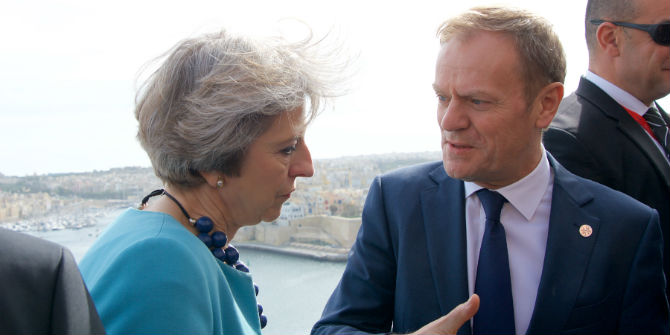As the result of last week’s election begins to sink in, one thing on the minds of politicians in Scotland, Wales and Northern Ireland is the fate of devolved authority after Brexit. Anthony M. Bertelli (Bocconi and Penn State) asks how Brexit can give them more policymaking power.
Prime Minister Boris Johnson endorsed devolved authority during a September trip to Scotland: “We are going to maximise the power of the North. And we are going to make sure that it is people here who are in control over the things that matter to them.” Michael Russell, Scotland’s Secretary for Government Business and Constitutional Relations, saw things differently. He claimed that Westminster is “determined” to roll back devolution in favour of a “more centralised state.”
Do the parties even disagree? Greater Manchester mayor Andy Burnham thought not: “devolution is probably the only thing creating consensus across the political parties.” Local governments and constituent countries both want more.
What can Westminster do to influence devolution?
The so-called Sewel Convention requires any laws concerning devolved powers to pass a consent motion in the legislatures of Scotland, Wales and Northern Ireland. But Stormont is dormant at the moment, confusing the issue for Northern Ireland. Some devolved powers are now covered by EU law. Withdrawal would allow devolved parliaments to choose new arrangements. Still, autonomy comes at a price. It might lead to a “patchwork” of regulations that differ among the constituent countries of the UK.
Westminster has the right to harmonize policies if this were to happen. Back in 2018, then Cabinet Office Minister David Lidington conjured a light touch: “Westminster would only be involved where, to protect the UK common market or to meet our international obligations, we needed a pause—I stress pause—to give the governments time to design and put in place a UK-wide framework.”Michael Russell would not have any of it, claiming that it “makes a mockery of claims of a partnership of equals.
Devolution is about delegation
So what will happen when Brexit comes? The picture clarifies when we think of the problem Westminster faces as one of getting the authority to make specific kinds of policies into the “right” hands. For the next PM (or the next, or the next…), doing so means not just deciding which policies to devolve, but also how much independence to give policymakers from their political overlords.
While some agencies are under the direct oversight of members of the Cabinet, others are constructed to do their work above the political fray. They have fewer consultation or reporting demands, have fewer statutorily imposed deadlines and their policy choices are less subject to appeals and spending limits. An agency’s independence and Westminster’s accountability for the policies it makes are inversely related. More independence means less accountability—and more opportunity to escape blame when outcomes aren’t what the government promised.
When Theresa May announced the closing of the UK Border Agency in response to “historical backlogs,” its functions went to the Home Office. She claimed that the UKBA’s “work at an arm’s length from Ministers…created a closed, secretive and defensive culture.” In effect, she made her government more accountable for border security, but less able to blame bureaucrats for bad performance. Giving an agency independence can mean outcomes that a government doesn’t like. But a key reason why politicians do this—and, intriguingly, delegation to the European Commission has been growing over time—is to reduce uncertainty about policy outcomes.
That’s true for two reasons. First, before delegating, Westminster can’t be completely sure what policies an agency prefers, whether that agency is in the central government or in a constituent country. Let’s call that prospect ideological drift. What’s more, Westminster won’t know the consequences of policies before they delegate or devolve them either. Let’s call this technical uncertainty. Independence can make ideological drift worse because when an agency prefers policies that don’t square with those the Westminster government wants, there are fewer rules to stop the agency from drifting.
Independence, though, can reduce technical uncertainty. Freedom of manoeuvre motivates agency personnel— who care enough about policy to make politicians worried about ideological drift in the first place—to carefully learn about policy consequences. The key tradeoff for Westminster as it considers devolution is between ideological drift and technical uncertainty.

Image by Virgin Trains East Coast, Creative Commons Attribution 3.0 Unported license.
How can the constituent countries get more power?
My colleagues and I recently studied the incentives Westminster will face when delegating policy responsibility that returns to the UK from EU agencies after Brexit. We compared a “hard” Brexit in which the EU retains no authority over UK policymaking to a “soft” alternative where policymaking remains shared between the EU and UK.
One important result of our analysis reflects the Brexiteers’ claims that shaping EU policy to reflect British interests is a difficult business. Devolution to a constituent country with structural independence is more likely to give Westminster the policies it wants than would an equally independent EU agency. And a “hard” Brexit means that this inferior outcome is no longer an option. We also find that the effect an agency’s independence has on either drift or uncertainty reduction doesn’t create incentives to change the structure of devolved policymaking.
In line with Prime Minister Boris Johnson’s claims, hard Brexit incentivizes more devolution. Soft Brexit, with policymaking power, shared between Westminster and Brussels, is altogether different. It reduces incentives to devolve when compared with both hard and pre-Brexit cases. And the erosion of devolved authority gets worse as the EU remains more involved in post-Brexit policymaking.
What kinds of policies would be devolved?
Devolution continues to be important in technical policy domains. Some of these are currently regulated by the EU, like flood-risk management. Technical policies should remain devolved—even under Soft Brexit—and remain so regardless of Britain’s post-withdrawal policy influence. But in any Brexit scenario, hard or soft, ideological policy areas like immigration create different incentives.
The incentive to devolve these areas depends on how much independence stimulates the devolved agent to reduce uncertainty. If it does this just enough to outweigh the ideological drift independence makes possible, devolution remains in Westminster’s interests. Under a Soft Brexit, devolution becomes less likely if Britain is more involved in post-Brexit decisionmaking.
Politicians, like the SNP’s Fiona Hyslop, might be well advised to tone down claims about an “overwhelmingly strong case for Scotland to have the power to tailor its own migration policy to reflect its own unique circumstances.” The incentives Westminster faces run precisely in the opposite direction.
When watching the post-Brexit devolution landscape unfold, observers and commentators should look to understand the relationship between ideological drift and uncertainty reduction the policies being debated. This tradeoff holds the key to the next government’s incentives regarding devolution.
This post represents the views of the author and not those of the Brexit blog, nor the LSE.






This is a terribly technocratic article, and completely ignores the power of nationalist emotion. English commentators especially are loathe to make a connection between the support for Brexit and English nationalism. However this election has undoubtedly super-charged the nationalist emotion I touched on before the election.
Just do a simple regional analysis of the election results. Northern England, Central England and Southern England – all more pro-Brexit than they already were. Greater London – still strongly Remain. Wales – still 50/50 split Brexit/Remain. Scotland – more pro-Remain than it already was. Northern Ireland – more pro-Remain than it already was.
In fact many brexiteers, including myself, regard themselves as British.
British nationalism is by no means incompatible with devolution; many favour a federal model for the United Kingdom.
That model, together with empowerment of local nationalism, regionalism, has already been given a suggested form in the act of union HL 2017-19 bill considered in the house of lords recently.
Constitutional reform, following that hilariously incompetent gerrymander attempt, devolution in the Blair years, is long overdue, not least to finally answer the pesky ‘West Lothian question’.
But much of the nationalism of brexiteers is by no means ‘English’; simply a reassertion of Britain’s love of control over its executive.
The mystery is why so many in this country and in the rest of Europe are content with the corrupt and democratically unaccountable imperial court that is the eu.